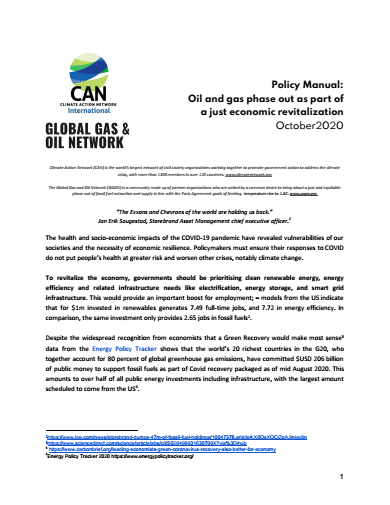CAN Statement on the UNGA: A confluence of crises that requires the strongest levels of multilateral cooperation and international solidarity

CAN Statement for UNGA and NY Climate Week
Just Reboot: building social and environmental resilience
” A confluence of crises that requires the strongest levels of multilateral cooperation and international solidarity”
September 21, 2020
This year the UNGA and Climate Week will take place in a very different context. Last years UNSG summit saw a dedicated focus to climate change backed by massive public momentum. In contrast, this years UN meetings will take place online amidst a historic global pandemic. But the ecological and climate crisis has not abated. In fact, it has become worse with record-breaking climate disasters affecting every part of the world. Added to this, the global economic and social crises, an outcome from the pandemic, has exposed staggering inequalities within and among countries. This is an unprecedented confluence of crises that requires the strongest levels of multilateral cooperation and international solidarity.
As governments try to solve the massive job losses within their countries and salvage their economies, they must ensure that all post-Covid19 recovery is Just and sustainable. This means that all public spending and public policies through economic stimulus packages must take a long-term view to stop the climate crisis.
However, more than eight months into this pandemic most governments, particularly the richest 20 economies, have actually committed $205 billion to fossil fuel energy compared to $135 billion to clean energy. High-emitting sectors have stood first in the line for bailouts and emergency loans rather than social protection programmes for workers and the most vulnerable in society.
Climate Action Network* calls on all world leaders, CEOs and decision-makers who gather virtually this week to recognize the interconnections of these multiple crises and use this opportunity to put climate action at the heart of commitments and discussions to secure an inclusive and green future.
CAN joins like-minded organizations in calling for the establishment of a UN Summit on Just and Environmentally Sustainable Global Recovery as early as possible in 2021.
Specifically, we ask that:
- Major emitters step-up and show climate leadership starting by committing to climate ambition and finance in line with principles of equity and fair-shares. Well into 2020, it is noteworthy that vulnerable and developing countries have shown more climate leadership in this regard (i.e. Jamaica, Rwanda).
- Governments engage civil society at every stage in the development and implementation of national climate policies geared towards addressing the needs of the most vulnerable.
- The climate emergency requires ambitious nationally determined contributions (NDCs) which must serve as the backbone of economic recovery in the coming years. It is critical that major economies submit their NDCs this year in line with a 1.5C degree pathway and outline how they align with economic recovery packages.
- Record-breaking climate disasters around the world serve as a daily reminder that the poor and marginalized are at the forefront of the climate emergency. Efforts to build resilience and adaptation must be a high priority for governments.
- The international community needs a collaborative process to measure human wellbeing in an adequate way. Gross Domestic Product, while useful in some ways, is biased and narrow. We need to create a functional and science-based indicator for people’s well-being.
- Rich countries must honour their climate commitments, including by providing their fair share of climate finance to poor countries, including the USD100 billion by 2020.
- With rising impacts, Loss & Damage requires urgent and increased political attention and additional finance through specific international mechanisms.
- All economic stimulus packages henceforth must be aligned with the objectives of the Paris Agreement and the 1.5C degree goal.
- Governments and the private sector should invest in a Just Transition away from the production and use of fossil fuels, embedding this within the investments for the economic recovery plans.
- Developing and poor countries deserve a better international fiscal deal. A global agreement on debt relief and cancellation in line with financial solidarity interventions and co-responsibility should be initiated immediately.
We demand that global leaders act in line with science with a human-rights based approach by listening to and prioritising the demands of young people, Indigenous People and local communities.
*About CAN
Climate Action Network (CAN) is a worldwide network of over 1300 civil society and Non-Governmental Organizations (NGOs) in over 130 countries working to stop the climate crisis.

